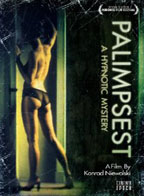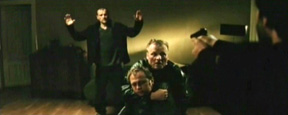
 PALIMPSEST: A Hypnotic Mystery
PALIMPSEST: A Hypnotic MysteryDirected by Konrad Niewolski
Poland/2006 – 85 minutes/ Widescreen
DVD Provided byCinema Epoch
Article written by Craig Hamann
Have you ever experienced déjà vu? You
know, that feeling that you’ve seen or done something before, even
though the experience should be brand new. Filmmaker Konrad Niewolski
takes the audience through a “we’ve seen all this before”
psychological head-trip in PALIMPSEST: A Hypnotic
Mystery. Police detective Marek is a cop on the edge who is looking
into the death of his partner. As with many of these kinds of mysteries,
the reason why he’s a “cop on the edge” is because he’s
having drinking problems, bad dreams and sleeplessness, an affair with
a woman, and an inability to cope with his love interest or the other
police detectives that he works with on the case. As you might guess,
the case is not all that it seems to be, his former partner may not have
been who he seemed to be, his girlfriend isn’t who she seems to
be, and even Marek isn’t who he seems to be. And then there is the
big twist, which reveals why nothing is as it seems to be but any observant
genre fan can see coming a mile away.
Okay, does this film have its fair share of symbolism? Yes. Are there
things that the viewer might miss the first time he or she watches the
film? Yes. Still, this is retread material, regardless how you cut it.
Some may call this film a disturbing psychological thriller and it sort
of is, but it’s not an extraordinarily disturbing thriller that
will stick with you for a long time. Some may say this film will keep
you guessing and it will, but only for a while. As I said before, most
any genre fan will catch on to the big twist long before it presents itself,
which pretty much nullifies any plot guessing from about the late second
act until the end. Some may say that this film is about the psychological
confusion and eventual breakdown of the lead character and I wouldn’t
argue against that. But I’m not going to say that the screenplay
explores anything new in the process.
On the other hand, Andrzej Chyra is sensational in the role of Detective Marek. Too bad he isn’t given more refreshing material to work with, because Chyra fills in Marek’s character with an impressive balance of intellectual subtexting and emotional depth. The pacing of the film is fairly slow, but it’s not tiring watching Marek attempting to wend his way through the mystery, regardless how obvious the mystery is at any given time. That’s because the camera loves Chyra and he’s confident and professional enough in his work that he doesn’t need to over-amp his performance. He plays it real. If an actor believes the situation, then the audience will believe it as well. The rest of the performances are also well crafted, though again, they suffer from the limitations of the screenplay.
There is an abundance of green hues in this flick. In fact, pretty much every scene is starkly contrastive and filled with green. That said, I don’t want to take any shots at the photography. Filmmaker Niewolski and cinematographer Arkadiusz Tomiak actually do a good job at keeping the film darkly toned both visually and thematically. While the mystery unravels slowly, the photography keeps things edgy, sometimes almost otherworldly (as in the dream sequences), and the visuals are definitely assets for the actors’ performances.
I don’t know how every DVD disc of this film looks, but the picture quality of the one I watched was muddy at best and sometimes contained what looked to me to be print damage. While I thought the project was photographed nicely, its color timing is occasionally too dark, so dark that there are times when I couldn’t tell what was happening on the screen. I was also surprised to see the subtitles burned into the visuals instead of a letterboxed presentation with subtitles beneath the picture. Very unfortunate. The sound quality is about average. It’s not difficult to hear the actors deliver their lines, but there is little richness to their voices. Aside from kind of an afterthought photo gallery and a series of one-sheets from other Cinema Epoch releases, there were no extras.
PALIMPSEST: A Hypnotic
Mystery relies heavily on the shadowy photography with its constant green
hues, the stark atmospheres, and the solid professionalism from the lead
actor to carry the story. In that way the film is an incomplete project.
Would it have killed the production staff to have had screenwriter Igor
Brejdygant take another pass at the screenplay and maybe lose a few of
the trite ideas? All the greenish noir scenes and visual hallucinatory
echoes from the Marek’s mind are fine, even interesting, but they
don’t compensate for a story that offers stock characters and a
predictable outcome to Marek’s psychological imbalance. I’ll
go ahead and give Niewolski’s film a mild recommendation to genre
fans, but it sure could have been a better film with a stronger screenplay.
 |
 |
 |